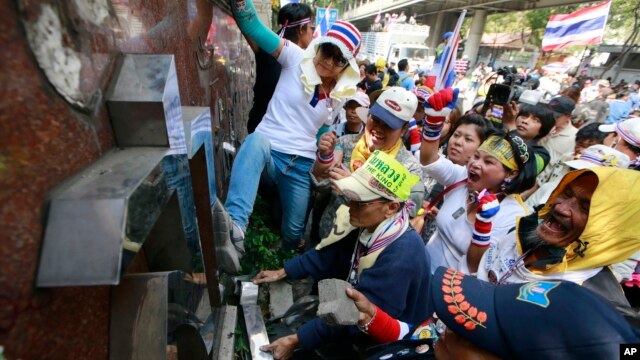
Anti-government protesters break the police sign outside police headquarters during a rally in Bangkok, Thailand, Jan. 22, 2014.
BANGKOK — Thai anti-government demonstrators in Bangkok remained defiant on the first day of a state of emergency in the capital. Analysts say fears of further violence and uncertainty remain in the lead up to elections on February 2.
Protest leader Suthep Thangsuban led a convoy of anti-government protesters in central Bangkok in defiance of the government's declaration of a state of emergency, which came into effect Wednesday.
Suthep, a former opposition lawmaker who has led protests since November, is calling for the prime minister's resignation. He said the weeks of rallies would continue despite the decree.
The protesters have moved to blockade key roads in Bangkok for more than a week to pressure the government to postpone general elections and instead set in place reforms before a fresh vote.
The Thai Foreign Ministry permanent secretary, Sihasak Phuoangketkew, told the media Wednesday fears of violence ahead of the vote was the main reason for the state of emergency being declared.
"Just ahead and there's concern that perhaps there could be more incidents and so I think this is maybe more or less a preemptive measure so that the police, the security personnel can be in a better position to deal with any situation we might be confronted with in the future, especially with the lead up to the coming election," said Sihasak.
The decree, overseen by the police with support from the Thai military, covers only Bangkok and the surrounding provinces for up to 60 days and grants authorities wide powers.
But Kraisak Choonhavan, a member of the opposition Democrat Party which is boycotting next month's polls, said the decree has angered protesters.
"It's only heightened the anger and the protesters will no longer I think be subtle as they were. I think they've gone a bit too far by closing so many roads. But nevertheless you are seeing a fairly peaceful demonstrator," said Kraisak.
Fears of violence remain acute ahead of the February 2 poll. Officials said since the protests began in November, at least nine people have died and 554 have been injured. In two recent grenade attacks, one protester was killed and more than 60 injured.
On Wednesday a key leader of the pro-government Red Shirt Movement was shot in the northern government stronghold of Udon Thani; but he survived and was taken to a hospital.
Analysts said both sides appear deeply entrenched, with Prime Minister Yingluck Shinawatra remaining steadfast in the face of calls for her resignation.
The protesters said they were seeking to end the political influence of Yingluck's older brother, Thaksin Shinawatra, who fled Thailand in 2008 to avoid a jail sentence for corruption. The government attempted and failed to pass a blanket amnesty bill that would have led to Thaksin's return as a free man.
The government said the February 2 polls were the way to end the crisis. But the election commission has repeatedly called for the vote to be postponed to avoid bloodshed and a failed vote.
This week, the commission is seeking advice from the Constitutional Court over the legal status of setting new polls if the February 2 elections fail.
|
|
